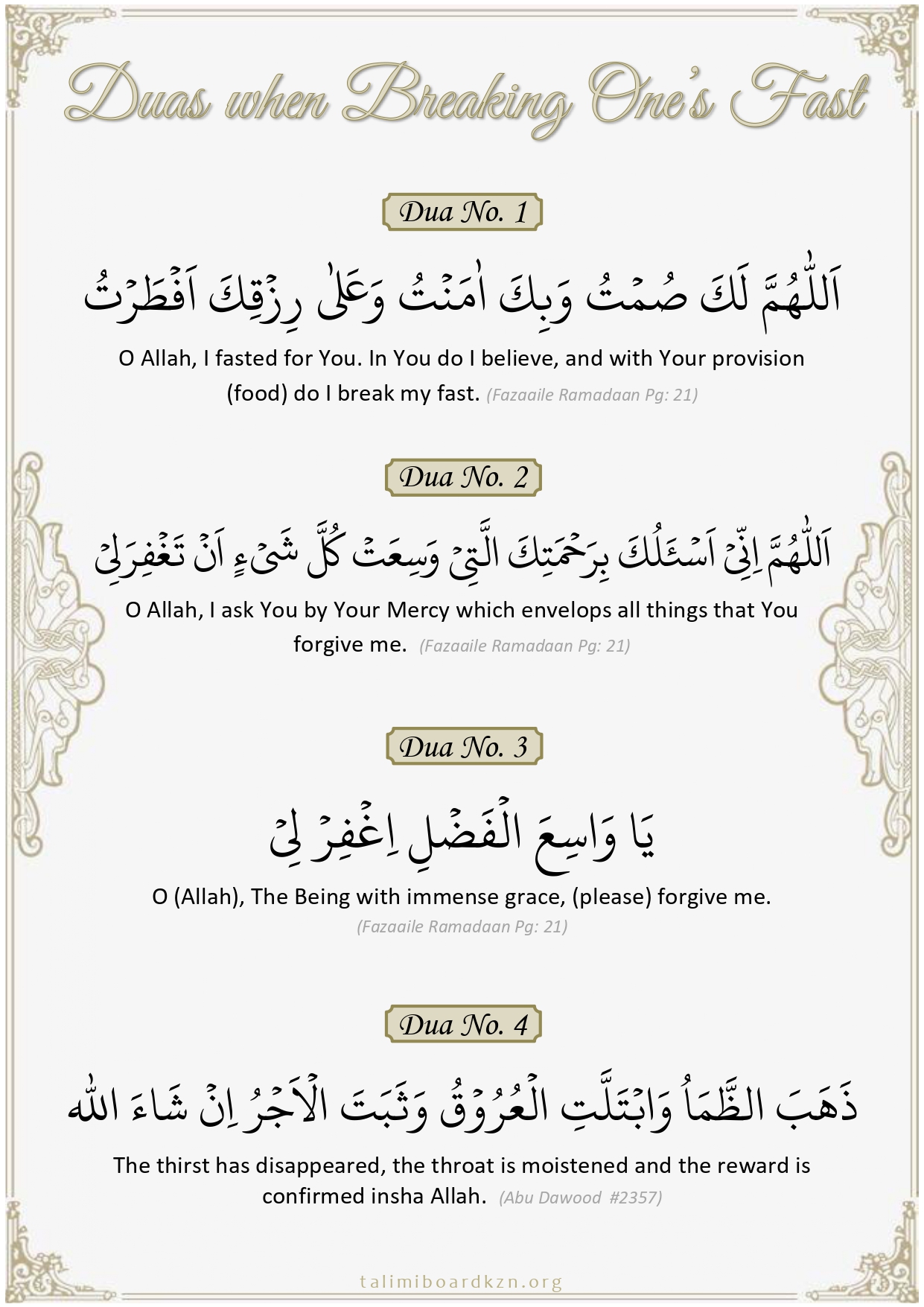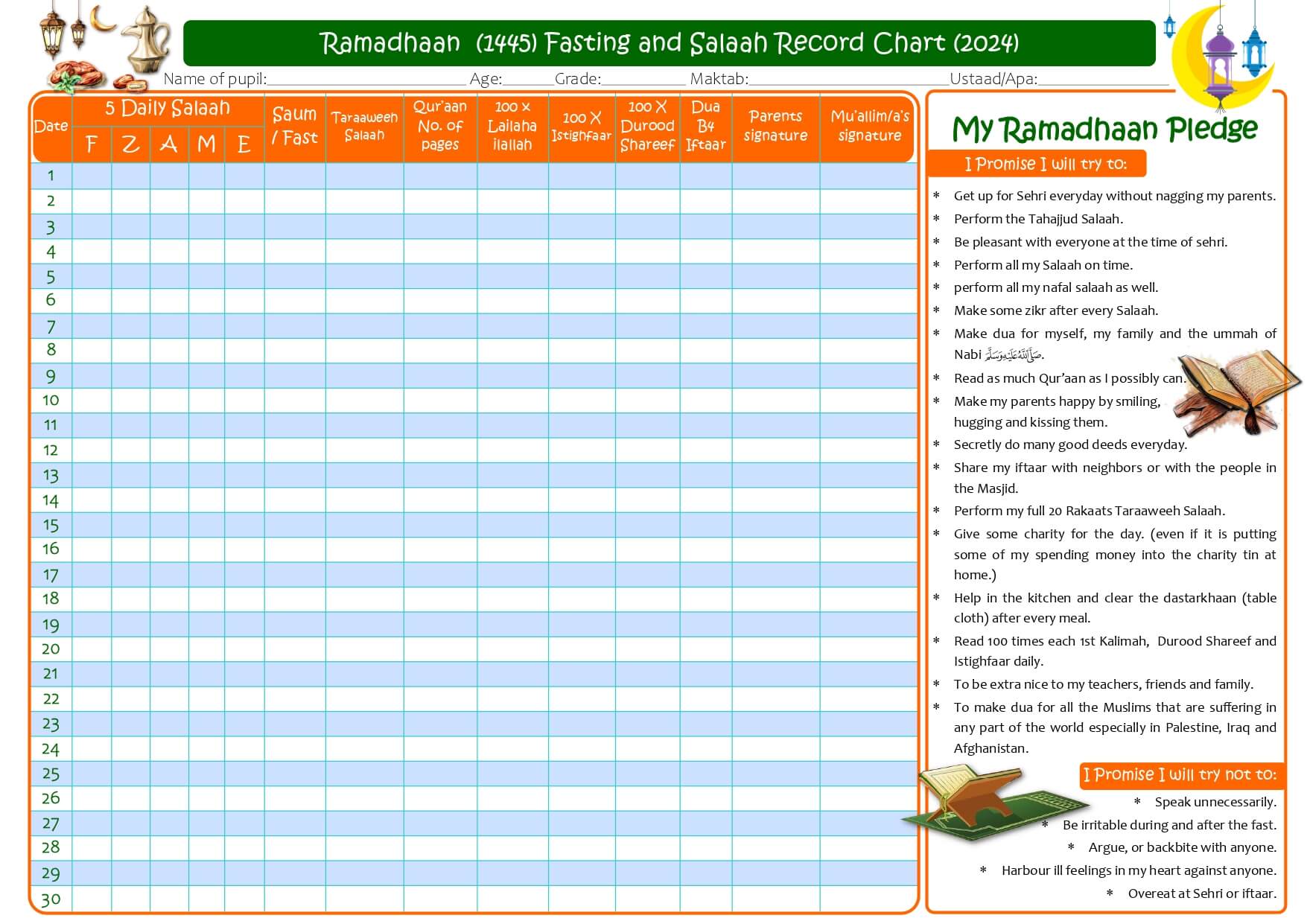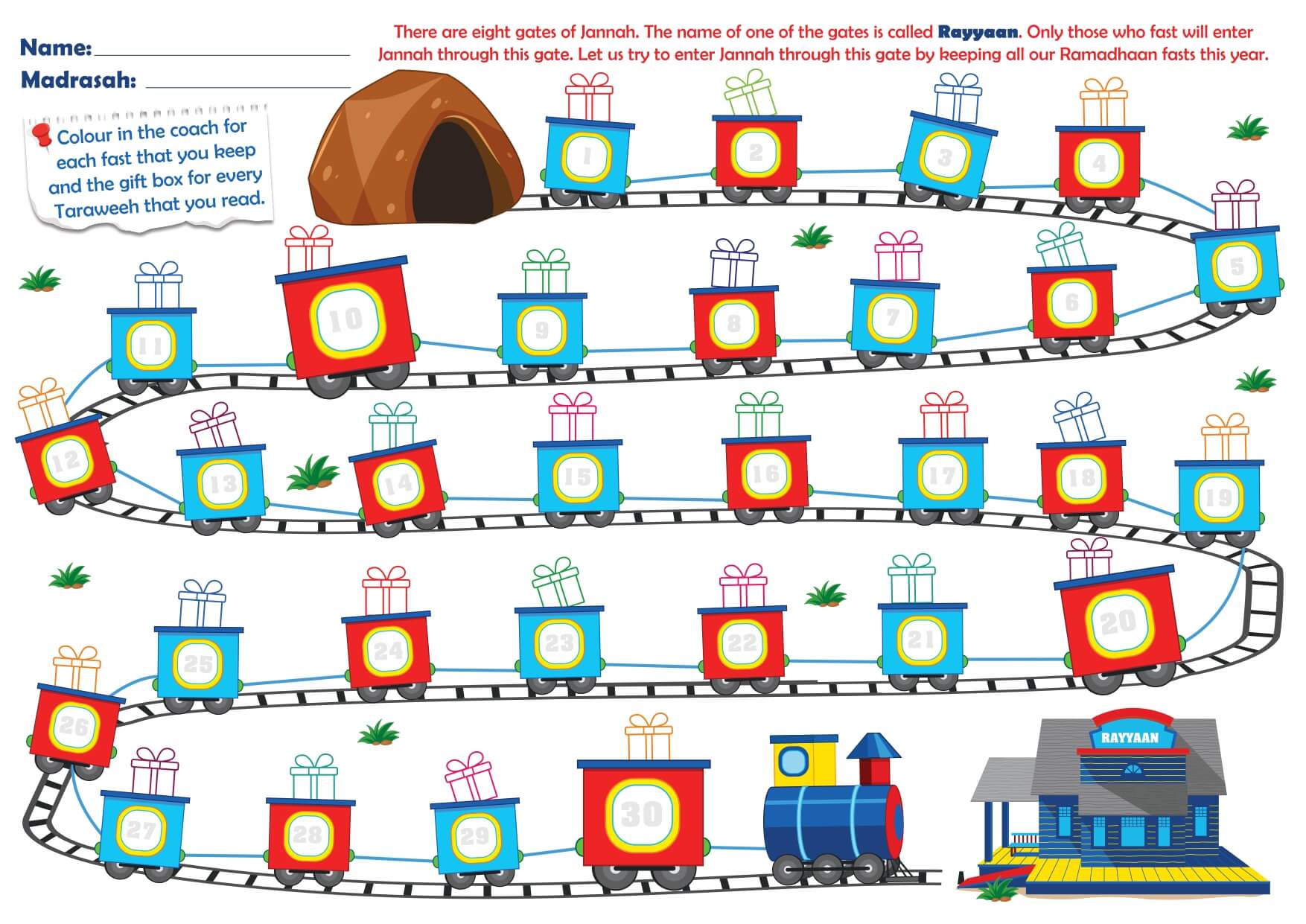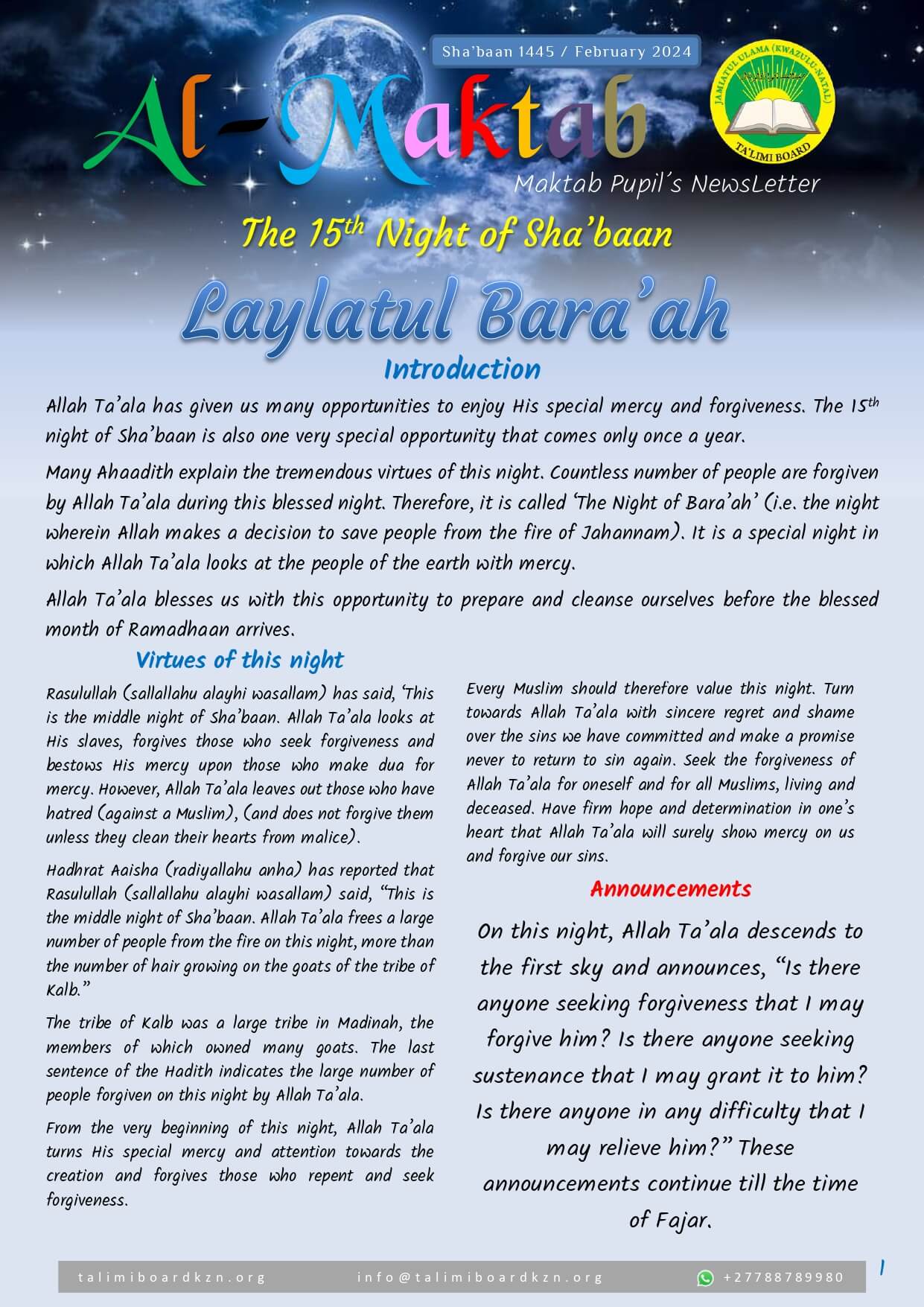The Kalimah “Laailaha illallah”
The story of Surah Burooj
In one of the nations of the past, there was a king who had a magician. When this magician reached old age, he said to the king, “Search for an intelligent youngster for me so that I may teach him my knowledge. I fear that I may pass away thereby causing this knowledge (of magic) to terminate without there being anyone among you who can teach it (to others).”
The king thus sent to him a youngster so that he may teach him. The youngster began attending his classes. On his way to the magician lived a monk. At that time Christianity was the true religion. The youngster once sat in the monk’s company and was impressed with what he had to say. Hence, thereafter, whenever he would go to the magician, he would first visit the monk. When he would reach the magician, he would beat him for arriving late. He thus complained to the monk regarding the dilemma he faced. The monk said, “When you fear the magician, say (to him), ‘My family delayed me.’ And when you fear your family, say (to them), ‘The magician has delayed me.’”
This continued for some time, until one day he came across a lion that was blocking the people’s path. He said to himself, “Today I will find out who is better – the magician or the monk.” He thus picked up a rock and said, “O Allah, if the monk’s ways are more beloved to you than that of the magician, kill this animal so that the people may pass.” He then threw the rock at the animal and killed it, after which he went to the monk and informed him of what had happened. The monk said to him, “O my son! Today you are better than me, as you have reached such a level that I can see. You will certainly be put through trials. Hence, when you are tested, do not disclose my identity.”
Allah Ta‘ala had also blessed this youngster by allowing him to cure the blind and lepers among many other sicknesses. Thus, a courtier of the king who had become blind heard of the youngster and brought him many gifts. He told him that if he is able to cure him, all these gifts will be his. The youngster replied, “I do not cure anyone. It is only Allah Who cures. If you believe in Allah, I will supplicate to Allah to cure you.” So the courtier brought faith in Allah Ta‘ala and Allah Ta‘ala cured him.
The courtier then returned to the king and sat near him as per his habit. The king asked him, “Who returned your eyesight?” He replied, “My Rabb.” The king asked, “Do you have a lord besides me?” He replied, “My Rabb and your Rabb is Allah.” The king was enraged by this and thus seized him and continued torturing him until he informed him of the youngster. When the youngster was brought before the king, he asked him, “O my son! Your magic has reached such a level that you are able to cure the blind, the lepers, and you do such and such things!” The youngster replied, “I do not cure anyone. It is only Allah Who cures.” The king thus seized him as well and continued torturing him until he informed him of the monk.
In this manner, the monk was also brought before the king. The king ordered him to renounce his religion. However, he remained firm and refused to do so. The king thus asked for a saw, which was then placed at the centre of the monk’s head. He was then mercilessly cut until both halves of his body fell apart. The king’s courtier was thereafter summoned and ordered, “Renounce your religion.” However, he too refused. A saw was also placed at the centre of his head and he was cut until both halves of his body fell apart.
Finally, the youngster was summoned and ordered to renounce his religion. However, like his two companions, he also refused to do so. The king thus handed him over to some of his people and instructed them to take him to the summit of a mountain. His instructions were that if they reach the summit and he has not yet renounced his religion, they should throw him off the mountain. They thus set off and took him to the top of the mountain. The youngster turned to Allah Ta‘ala and supplicated, “O Allah, save me from them in whichever way You wish.” Allah Ta‘ala caused the mountain to shake and they all fell off, but the youngster was saved. He then returned to the king who asked him what had happened to the others. He replied, “Allah saved me from them.”
The king then handed him over to another group. He instructed them to take him in a ship and set sail to the middle of the ocean. If he does not renounce his religion by then, they should cast him in the ocean. When this group set off with him, the youngster turned to Allah Ta‘ala and implored him just as he had done before. Allah Ta‘ala caused the ship to capsize and they all drowned, but the youngster survived. He then returned to the king who asked him what had happened to the others. He replied, “Allah saved me from them.”
The youngster eventually told the king, “You will never be able to kill me unless you do as I say.” The king asked what he should do. The youngster explained, “You should assemble all the people on a single plain and suspend me from a branch of a tree. You should then take an arrow from my quiver, place it in the centre of your bow and say, ‘In the name of Allah, the Rabb of the youngster.’ You should then shoot me. If you do so, you will kill me.”
Having no other option, the king agreed to do as the youngster suggested, just so that he may kill him, not realizing the outcome of his action. He thus assembled all the people in an open field. He then suspended the youngster from a tree, took an arrow from his quiver, placed it in the centre of the bow and said, “In the name of Allah, the Rabb of the youngster.” He then shot the arrow which struck the youngster’s temple. The youngster placed his hand on his temple and passed away just as he foretold. On seeing this, the people realized that the religion of the youngster was indeed true and they proclaimed thrice, “We believe in the Rabb of the youngster.”
In this manner, the king’s plan backfired and what he feared became a reality – the people had brought imaan. The king was obviously enraged and ordered trenches to be dug on the roads. Fires were ignited therein. He then instructed his men to cast anyone who does not renounce his Deen in the fire. They obeyed his order and began casting them into the fire. In their anxiousness to give their life for Allah Ta‘ala, the believers were actually rushing to leap in the fire. Among them was a woman who had an infant child. She was naturally overcome with concern for her child and thus hesitated to jump in. The small infant (who was not able to speak previously) addressed her saying, “O my mother! Exercise patience, for you are on the truth.”
In reference to these trenches and the perpetrators of this heinous crime, Allah Ta‘ala states
قُتِلَ أَصْحَٰبُ ٱلْأُخْدُودِ ﴿٤﴾ ٱلنَّارِ ذَاتِ ٱلْوَقُودِ ﴿٥﴾ إِذْ هُمْ عَلَيْهَا قُعُودٌ ﴿٦﴾ وَهُمْ عَلَىٰ مَا يَفْعَلُونَ بِٱلْمُؤْمِنِينَ شُهُودٌ ﴿٧﴾ وَمَا نَقَمُوا۟ مِنْهُمْ إِلَّآ أَن يُؤْمِنُوا۟ بِٱللَّهِ ٱلْعَزِيزِ ٱلْحَمِيدِ
“Cursed were the people of the trenches, the (people of the) fire that was rich with fuel, when they were sitting by it, and were watching what they were doing with the believers. They punished them for nothing but that they believed in Allah, the All-Mighty, the Worthy of All Praise.” (Surah Burooj v4-8)
According to one narration, many years later, in the time of Sayyiduna ‘Umar (radhiyallahu ‘anhu), this youngster’s body was uncovered and surprisingly, his finger was still on his temple just as it was when he passed away.
(Saheeh Muslim #7511, Musnad Ahmad #23931 and Sunan Tirmizi #3340)
Please find attached two forms for the children to use in Ramadhaan.
2. Salaah, zikr, Taraaweeh and Fasting form — To be used for Grades 3 upwards.
If possible please print out these forms for the children in your class and encourage them to use their time profitably in Ramadhaan and uphold this great pillar of Islam.
The bigger students must also be encouraged to make a khatam of the Qur-aan. Alhamdulillah last year many children in Grade 5, 6 and 7 completed two-three khatams of the entire Qur-aan, Masha Allah.
May Allah bless us all with a wonderful Ramadhaan and make it a means of attaining the special mercy and forgiveness of Allah Ta’ala.
Working with Weak Learners
Question:
Assalamu alaykum warahmatullahi wabarakaatuh.
In the grade O class there is a student that finds recognising zabr, zer and pesh very difficult. Can Moulana please advise what should be done with him?
In the grade 2 class there is a student that cannot learn anything at all. It takes him very very long to learn and he keeps on forgetting whatever he learns. Can Moulana also advise what should be done with him? Jazakallah khair ahsanal jazaa
Answer:
Muhtaram
Assalaamu alaykum wa rahmatullahi wa barakaatuhu.
I make dua that you be well.
Many a times in a maktab you have students of this nature who cannot learn and comprehend for some reason. We should try our best to still teach them even though they may be extremely weak. Their presence in the madrasah is better than being in some other evil environment outside the Madrasah.
These weak children in our makaatib are actually a source of great blessing for us. The Hadith of Rasulullah (sallallahu alayhi wasallam) says, “Innama tunsaruna wa turzaquna bidufaaikum” Allah Ta’ala’s help and sustenance descends upon us on account of these weak children. Many a times, it is these weak children who later on in life become such stars of Islam that they will make our names shine in this world and the next.
The following are some ways we can adopt that may be beneficial for us to reach the child:
- Take out time every day and make special dua for him by taking his name.
- Visit his home and request his parents to assist in teaching him at home. If his parents are not in a position to teach him then ask some neighbour or anyone else in the community to help him.
- Give out some sadaqah every now and again, even if it’s a small amount, on his behalf requesting Allah Ta’ala to remove any blockages that may be hindering his progress.
- Try to allocate some special time out of maktab time to give him special attention. (e.g. a Saturday morning)
- Show him lots of love and attention from your heart. This will help to make him open up to you.
- After giving him his sabak in class, pair him up with a bright pupil who may help him learn his sabak.
- Always use encouraging words to lift his self-esteem. Never ever discourage him.
It is mentioned that Hadhrat Imaam Shafiee (RA) once sat with a student and explained a masalah to him 78 times until eventually he understood it. In this day and age, this is our challenge, to be able to work with such children.
May Allah Ta’ala make your task easy for you and crown your efforts with success. Aameen.




